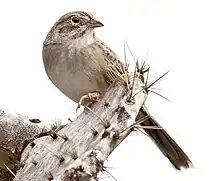Peucaea
Peucaea is a genus of American sparrows. The species in this genus used to be included in the genus Aimophila.
| Peucaea | |
|---|---|
 | |
| Cassin's sparrow (Peucaea cassinii) | |
| Scientific classification | |
| Domain: | Eukaryota |
| Kingdom: | Animalia |
| Phylum: | Chordata |
| Clade: | Dinosauria |
| Class: | Aves |
| Order: | Passeriformes |
| Family: | Passerellidae |
| Genus: | Peucaea Audubon, 1839 |
| Type species | |
| Fringilla bachmani | |
| Species | |
|
See text | |
Taxonomy and species
A molecular phylogenetic study published in 2009 found that the genus Aimophila was polyphyletic.[3] In the resulting reorganization to create monophyletic genera, eight species were moved from Aimophila to the resurrected genus Peucaea.[4] Peucaea had been introduced by the Franco-American ornithologist John James Audubon in 1839.[5] The genus name is from the Ancient Greek peukē meaning "pine-tree".[6] The type species was designated by English zoologist George Robert Gray in 1841 as Fringilla bachmani, a taxon now considered to be a subspecies of Bachman's sparrow with the trinomial name Peucaea aestivalis bachmani.[4][7][8] Peucaea is the sister genus to Ammodramus within the family Passerellidae.[9]
The genus contains the following 8 species:[4]
- Rufous-winged sparrow, Peucaea carpalis
- Cinnamon-tailed sparrow, Peucaea sumichrasti
- Stripe-headed sparrow, Peucaea ruficauda
- Black-chested sparrow, Peucaea humeralis
- Bridled sparrow, Peucaea mystacalis
- Botteri's sparrow, Peucaea botterii
- Cassin's sparrow, Peucaea cassinii
- Bachman's sparrow, Peucaea aestivalis
Notes
References
- Audubon, John James (1827). "Bachmans Finch". The Birds of America; from original drawing. Vol. 2. London: Published by the author. Plate 165.
- Audubon, John James (1834). Ornithological Biography, or an account of the habits of the birds of the United States of America ; accompanied by descriptions of the objects represented in the work entitled The Birds of America, and interspersed with delineations of American scenery and manners. Vol. 2. Edinburgh: Adam Black. pp. 366–367.
- DaCosta, J.M.; Spellman, G.M.; Escalante, P.; Klicka, J. (2009). "A molecular systematic revision of two historically problematic songbird clades: Aimophila and Pipilo". Journal of Avian Biology. 40 (2): 206–216. doi:10.1111/j.1600-048X.2009.04514.x.
- Gill, Frank; Donsker, David; Rasmussen, Pamela, eds. (2020). "New World Sparrows, Bush Tanagers". IOC World Bird List Version 10.2. International Ornithologists' Union. Retrieved 12 October 2020.
- Audubon, John James (1839). A Synopsis of the Birds of North America. Edinburgh: Adam and Charles Black. p. 112.
- Jobling, James A. (2010). The Helm Dictionary of Scientific Bird Names. London: Christopher Helm. p. 300. ISBN 978-1-4081-2501-4.
- Gray, George Robert (1841). A List of the Genera of Birds : with their Synonyma and an Indication of the Typical Species of Each Genus (2nd ed.). London: R. and J.E. Taylor. p. 60.
- Dickinson, E.C.; Christidis, L., eds. (2014). The Howard & Moore Complete Checklist of the Birds of the World. Vol. 2: Passerines (4th ed.). Eastbourne, UK: Aves Press. p. 338. ISBN 978-0-9568611-2-2.
- Bryson, R.W.; Faircloth, B.C.; Tsai, W.L.E.; McCormack, J.E.; Klicka, J. (2016). "Target enrichment of thousands of ultraconserved elements sheds new light on early relationships within New World sparrows (Aves: Passerellidae)". The Auk. 133 (3): 451–458. doi:10.1642/AUK-16-26.1.